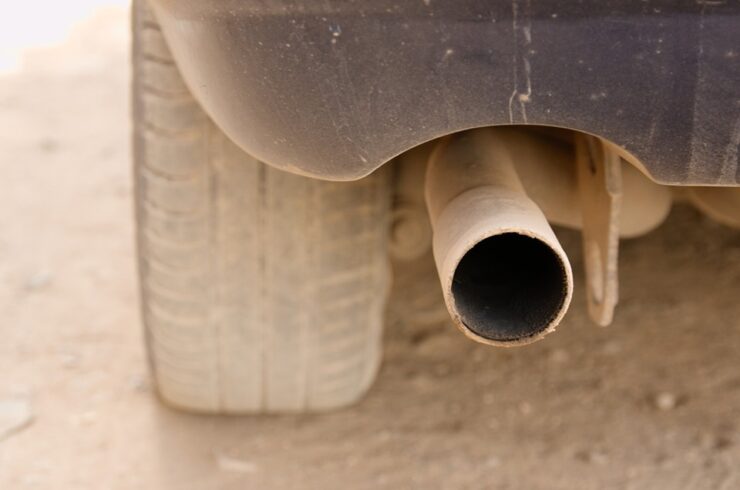What are catalytic converters: A catalytic converter is a device located in the exhaust system of any motor vehicle.
It contains a catalyst, and it converts three harmful exhausts emitting from the car engine into harmless compounds, to have less disastrous of an impact on the environment.
Those compounds being namely, hydrocarbons, carbon monoxide, and nitrogen oxides.
Carbon monoxide, especially, is poison for any creature that breathes air for its survival. So, in that regard, a catalytic converter can prove to be very useful.
Page Contents
Potential Issues With Catalytic Converter (Symptoms)
Catalytic converters last for ten years at most, and they usually wear out. They might become contaminated, overheated, clogged, and all this can physically damage them.
It will eventually lead to slow and sluggish engine performance and then finally, the engine shut down.
A catalytic converter that is near failing is not uncommon at all. Here are the symptoms of a deficiency or failed catalytic converter.
01. The engine will start misfiring
A catalytic converter can and will overheat and show signs of breaking down whenever your engine starts misfiring.
You will also notice similar symptoms if when a rich fuel mixture occurs in the oil tank.
The extreme fuel mixtures are going to give rise to ignition, and they will do that by letting the raw fuel into the converter.
It can prove to be quite dangerous, as it can melt the components of the catalyst converter.
02. Power loss while accelerating
Losing power during acceleration, or driving uphill is the most visible and common symptom of a clogged catalytic converter.
Usually, mechanics couldn’t find out the actual problem they suggest to change a few parts that are not necessary in such a case.
However, you can perform a simple experiment to confirm if this is true or not. You can check by yourself with your hand with low powered acceleration.
For checking the performance place your hand behind the tailpipe to push & ask your mechanic as the rpm of the vehicle remains between 1800-2000 for the test.
If the exhaust flow is hot, the converter is clogged for sure.
03. Overall degraded performance of the engine is another sign
Failing converter creates a back pressure, which is the reason for this occurrence. It negatively affects the engine and prevents it from running freely.
04. The performance of the exhaust system is not optimum
This is another effective way to notice a failing catalytic converter. You need to keep an eye on the performance of the exhaust system.
If the converter is not performing at its best, you will begin to notice a degradation in the performance of the exhaust system, and it sure as heck is going to a traced back to some error in the fuel system.
05. Fuel vapor test
With the help of assistance, you check the catalyst converter if it is in the carburetor system. For that, remove the air cleaner, use a torch near the intake of the carburetor.
Run the engine, and if you see the cloud vapor over the carburetor, then you can be sure that the catalyst converter has a clogging problem.
Remove the air cleaner. Ask somebody around you to flash a torchlight near the intake of the carburetor.
Rev the engine check to see if there occurs a cloud of vapored fuel above the carburetor.
If this is the case, then without the slightest room of doubt, you will be able to assume that your car’s catalytic converter is clogged, and it’s about time you pay it some attention.
06. Increased emissions
If your vehicle shows the signs of some increased emissions, it sure is a heads up because that is a sign of a bad catalytic converter.
Of course, the catalytic converter will not be able to perform its job correctly if it is showing a reduced amount of efficiency. And the main role it has to perform is to reduce gaseous emission.
A high amount of carbon emission surely is a bad sign.
This problem should be deemed as extremely attention-worthy as if it is not addressed on time; it will manage to damage the entire exhaust system.
Reasons For Catalytic Converter Failure
At this point, if the catalytic converter requires replacement or fixing, it is probably due to any of these reasons:
01. A tune-up of Engine is pending
A catalytic converter can face several problems if the engine tune-up is required.
If the engine continues to operate outside its appropriate circumstances, unwanted wear and tear are going to occur, and it will make the engine go out of its way to perform in the manner it would have done quickly otherwise.
Damage is usually caused due to the air and fuel mixing in an incorrect manner, wrong timing, or misfired spark plugs.
02. More fuel entering the appropriate exhaust
The fuel which is meant to power the vehicle is supposed to be present and be burnt in the power chamber only.
If some, or even a little amount of fuel manages to escape the combustion chamber unburnt, it is going to penetrate the exhaust system, and ignite as soon as it enters catalytic converter.
This will cause the catalytic converter to superheat, and a meltdown can occur.
03. If antifreeze or oil
Either of them come into the exhaust system, it will result in power loss and overly heated engine components.
04. Oxygen sensor fails
This can lead to the sensor taking wrong readings of the gases from the exhaust. The broken sensor will result in terrible conditions.
In the case of the rich, the catalyst will meltdown. In the case of lean, the catalyst won’t convert harmful gases into harmless ones.
05. Road damage can lead to a converter failure
The catalytic converter comprises a fragile material. If the tires strike against the debris or any potholes, they are going to give a shock to the converter, in turn damaging it.
Removing Catalytic Converter/ Replacement Cost
Catalytic converters are not cheap to replace. For most of the vehicles, the cost of replacing it ranges from $945 to $2475, including labor and parts.
The catalytic converter’s value might be up to $2250. You can buy another car at that price.
And, in the event you need to strip two wires coming from your automotive electrical connections, consider using a hydraulic crimper on which you read more here.

